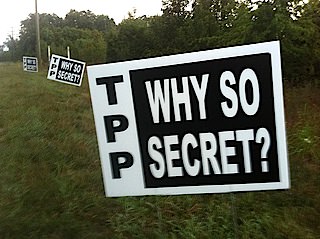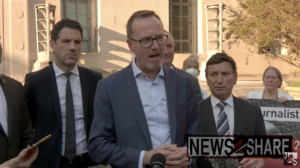Yet More Power for the Global 1 Percent
The Trans-Pacific Partnership, a U.S.-led free trade agreement that would exempt multinational corporations from having to comply with policies governing industry in signatory countries, looks set to be rammed into law without comment or notice from much of the American media.
Much is made over the alleged ceding of U.S. sovereignty to international bodies every time a potential global treaty appears in the news. The Trans-Pacific Partnership, a U.S.-led free trade agreement that would exempt multinational corporations from having to comply with policies governing industry in signatory countries, appears to be the real thing.
In 2008, American leaders gave a $13 trillion bailout to the banks that drove the nation into economic bedlam. Late last month, officials in Cyprus failed in an attempt to confiscate depositor funds in order to qualify for inclusion in a European bailout of their own. And a recently uncovered paper by the U.S. Federal Deposit Insurance Corporation and the Bank of England written in late 2012 showed that G-20 countries have long been laying the groundwork for similar action within their own borders in the event that another crisis strikes.
Taken together, those three events should eliminate any doubt about the loyalties of many of the world’s major governments when it comes to disbursing public money. They’re with the rich and against everyone else. The average citizen’s earnings — whether they sit in a bank account or in a treasury in the form of taxes — belong to the ruling class if they wish to take them.
The Trans-Pacific Partnership is a circumvention of government. Its draft statement is not a product of the deliberation of U.S. legislators or apparently legislators in other countries, but of the Obama administration and representatives of deliberating nations and roughly 600 corporations. The talks are held multiple times a year and always in secrecy. Helicopters hover overhead while paramilitary teams patrol the conference grounds and a near-total media blackout ensures little is learned by anyone outside. As U.S. Sen. Ron Wyden, the chair of the congressional committee that is supposed to have jurisdiction over the TPP, said in a statement to Congress:
“The majority of Congress is being kept in the dark as to the substance of the TPP negotiations, while representatives of U.S. corporations — like Halliburton, Chevron, PhaRMA, Comcast and the Motion Picture Association of America — are being consulted and made privy to details of the agreement.”
If ratified, what would the agreement do? Much in the favor of big business. Signatory nations, including Australia, Brunei, Chile, Canada, Malaysia, Mexico, New Zealand, Peru, Singapore and Vietnam would agree to give “multinational corporations unprecedented rights to demand taxpayer compensation for policies they think will undermine their expected future profits straight from the treasuries of participating nations,” journalist Nile Bowie explains in CounterPunch. “It would push the agenda of Big PhaRMA in the developing world to impose longer monopoly controls on drugs, drastically limiting access to affordable generic medications that people depend on. The TPP would undermine food safety by limiting labeling and forcing countries like the United States to import food that fails to meet its national safety standards, in addition to banning Buy America or Buy Local preferences.”
“According to leaked draft texts, the TPP would also impose investor protections that incentivize offshoring jobs through special benefits for companies,” Bowie continues. “The TPP stifles innovation by requiring internet service providers to police user-activity and treat small-scale individual downloads as large-scale for-profit violators. Most predictably, it would rollback regulation of finance capital predators on Wall Street by prohibiting bans on risky financial services and preventing signatory nations from exercising the ability to independently pursue monetary policy and issue capital controls — signatories must permit the free flow of derivatives, currency speculation and other manipulative financial instruments. The US-led partnership — which seeks to impose ‘Shock and Awe’ Globalization – aims to abolish the accountability of multinational corporations to the governments of countries with which they trade by making signatory governments accountable to corporations for costs imposed by national laws and regulations, including health, safety and environmental regulations.”
The TPP regime would ensure “that foreign investors and multinational corporations retain full rights to undermine the sovereignty of participatory nations by skirting domestic regulations and limiting the abilities of national governments to issue independent economic policy. There has never been such a sweeping corporate assault on sovereignty, and that includes US sovereignty. Leaked TPP documents detail how the Obama administration intends to surrender US sovereignty to international tribunals that operate under World Bank and UN rules to settle disputes arising under the TPP, specifically designed to leave Congress out in the cold while creating a judicial authority higher than the US Supreme Court. In theory, the TPP would give international judicial entities the authority to override US laws, allowing foreign companies doing business in the United States the privilege of operating in a legal environment that would give them significant economic advantages over American companies that remain tied to US laws, placing domestic companies who do not move offshore at a competitive disadvantage.”
Why is Obama pursuing global trade terms that could diminish U.S. sovereignty? It appears to have something to do with drawing Pacific region economies away from trade with China, presumably to improve American economic health as the administration sees fit. The secretive nature of the talks make it difficult to tell exactly what is going on. For now, we’re dependent on leaked texts and the approximations of outsider experts, even as an agreement appears to be not far away. Bowie explains again:
“Due to the unconstitutional nature of the TPP, members of Congress would likely object to many of its stipulations — naturally, the Obama administration is employing its executive muscle to restrict congressional authority by operating under ‘fast-track authority,’ a trade provision that requires Congress to review an FTA under limited debate in an accelerated time frame subject to a yes-or-no vote so as to assure foreign partners that the FTA, once signed, will not be changed during the legislative process. No formal steps have been taken to consult Congress as the agreement continues to be negotiated, and Obama looks set to subtly ram the treaty into law.”
Your support matters…Independent journalism is under threat and overshadowed by heavily funded mainstream media.
You can help level the playing field. Become a member.
Your tax-deductible contribution keeps us digging beneath the headlines to give you thought-provoking, investigative reporting and analysis that unearths what's really happening- without compromise.
Give today to support our courageous, independent journalists.






You need to be a supporter to comment.
There are currently no responses to this article.
Be the first to respond.